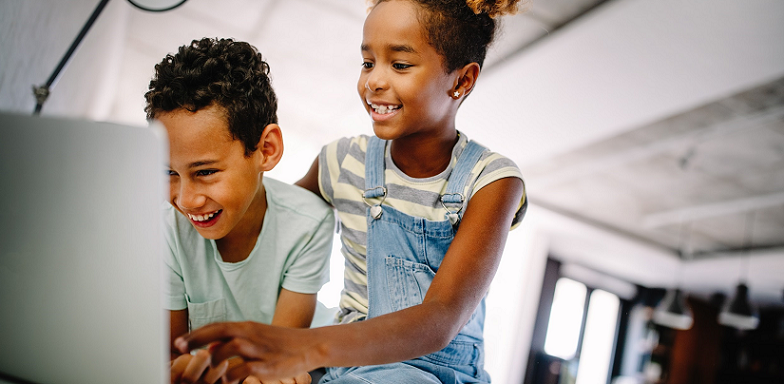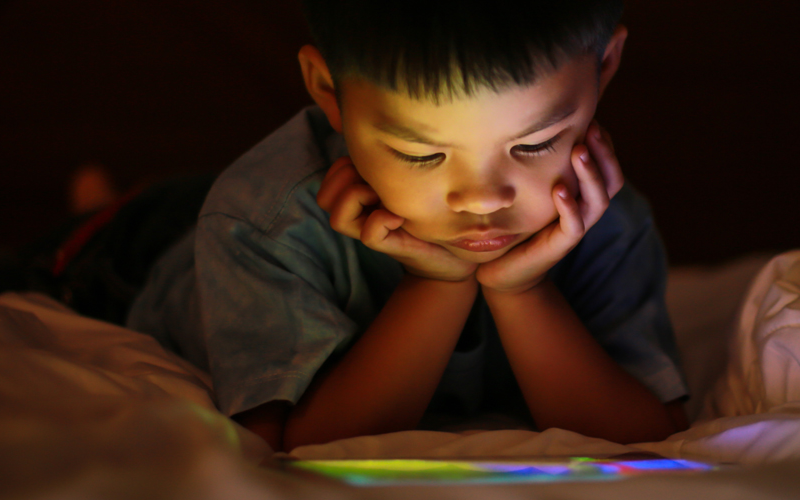Excessive screen time has been linked to a number of negative effects on children’s mental health, including decreased attention span and cognitive development, disrupted sleep patterns, increased anxiety and depression, and decreased social skills and emotional regulation. However, it’s important to note that moderation and appropriate usage are key, as technology can also provide educational and entertainment benefits for children when used in moderation and with appropriate guidance from a parent or guardian.
Negative Mental Health Aspects of Children’s Screen Time
The impact of screen time on children’s mental health is a complex issue with many factors to consider. Here are several ways in which too much screen time can be detrimental to a child’s mental health.
Attention and Cognitive Development Issues With Excessive Screen Time
Children who spend excessive amounts of time in front of screens may have a harder time focusing and paying attention, which can negatively impact their learning and overall cognitive development in several ways:
- Decreased Attention Span: Excessive screen time can lead to decreased attention span, as children become more easily distracted and less able to focus for extended periods of time.
- Impaired Executive Function: Executive function refers to the cognitive processes that help us plan, prioritize, and complete tasks. Studies have shown that excessive screen time can impair these processes in children.
- Decreased Visual-Spatial Skills: Screen time can also negatively impact visual-spatial skills, which are essential for tasks such as reading, writing, and navigating the physical world.
- Altered Brain Development: The brain continues to develop throughout childhood, and exposure to screens for long periods of time may alter the typical trajectory of development, particularly in the areas of the brain responsible for attention, executive function, and visual-spatial skills.
You should note that the impact of screen time on attention and cognitive development is not necessarily permanent, and can be mitigated by reducing screen time and engaging in other activities that promote brain development, such as reading, playing, and spending time in nature.

Screen Time and Children’s Sleep Patterns
Lack of sleep has been linked to a number of mental health issues in children, including depression, anxiety, and behavioral problems. Screen time can negatively impact a child’s sleep patterns in several ways:
- Blue Light: The blue light emitted by screens suppresses the production of the sleep hormone melatonin, making it more difficult for children to fall asleep and stay asleep.
- Disruptive Sleep Environment: Screen time before bedtime can also create a disruptive sleep environment, as children may become too stimulated or engaged in their devices to wind down and prepare for sleep.
- Reduced Sleep Quantity: Excessive screen time can also reduce the amount of time children spend sleeping, as they may be up later using devices or have difficulty falling asleep because of the blue light exposure.
- Altered Sleep Quality: The quality of sleep can also be altered by screen time, as children may experience more fragmented or restless sleep.
Lack of sleep can have serious consequences for a child’s overall health and well-being, including decreased attention and cognitive functioning, increased anxiety and depression, and behavioral problems. It’s important for parents and guardians to set healthy screen time limits and establish a bedtime routine that minimizes screens and promotes sleep.

Excessive Screen Time and Childhood Anxiety and Depression
Studies have shown that excessive screen time can contribute to feelings of anxiety and depression in children, particularly when it is spent on social media and other platforms that can be sources of bullying, cyber-aggression, and social comparison. Screen time can affect a child’s anxiety and depression in several ways:
- Social Comparison: Spending excessive time on social media and other platforms can lead to social comparison, where children compare themselves to others and feel inadequate, which can contribute to feelings of anxiety and depression.
- Cyber-Aggression and Bullying: Children who spend excessive time on screens may also be exposed to cyber-aggression and bullying, which can have a significant impact on their mental health.
- Decreased Face-to-Face Interaction: Screen time can also reduce the amount of face-to-face interaction children have with others, which is important for developing social skills and emotional regulation. This lack of interaction can contribute to feelings of anxiety and depression.
- Altered Emotional Regulation: The stimulation and overstimulation provided by screens can also make it more difficult for children to regulate their emotions, leading to feelings of anxiety and depression.
Parents and guardians should monitor their children’s screen time and usage, particularly on social media and other platforms, and to have open and ongoing conversations with their children about the potential risks and negative effects of excessive screen time. Additionally, encouraging children to engage in activities that promote face-to-face interaction, emotional regulation, and overall well-being can help mitigate the impact of screen time on anxiety and depression.

Screen Time and Social Skills and Emotional Regulation
Spending too much time on screens can also interfere with children’s ability to develop important social skills, such as face-to-face communication and empathy, as well as their ability to regulate their emotions and behavior. Screen time can negatively impact a child’s social skills and emotional regulation in several ways:
- Decreased Face-to-Face Interaction: Excessive screen time can reduce the amount of face-to-face interaction children have with others, which is important for developing social skills such as communication, empathy, and interpersonal relationships.
- Impaired Emotional Regulation: The stimulation provided by screens can also make it more difficult for children to regulate their emotions, leading to impulsiveness, aggression, and other behavioral problems.
- Decreased Empathy: Spending excessive time on screens can also reduce children’s ability to understand and respond to the emotions of others, which is an important component of empathy.
- Lack of Practice: Screen time can also prevent children from practicing and developing their social and emotional skills in real-world situations, as they may be more likely to rely on screens for entertainment and interaction.
Parents and guardians should set healthy screen time limits and encourage children to engage in activities that promote face-to-face interaction, emotional regulation, and overall well-being, such as playing with friends, participating in group activities, and volunteering. By doing so, they can help mitigate the impact of screen time on their children’s social skills and emotional regulation.

Positive Aspects of Screen Time and Children
Screen time can also have positive effects on children’s mental health, such as increased creativity and problem-solving skills, improved hand-eye coordination and motor skills, and access to educational and entertainment resources. It’s important for parents and guardians to set healthy screen time limits and monitor their children’s usage, while also encouraging a balance of screen time with other activities, such as outdoor play, exercise, and creative pursuits. Screen time can have positive aspects for children, including:
- Access to Information: Screens provide children with access to a wealth of information and resources, such as educational videos, online libraries, and interactive games that can support their learning and development.
- Improved Technology Skills: Screen time can also help children develop important technology skills that are in high demand in today’s digital age.
- Increased Creativity: Screens can also be used to support children’s creativity, through activities such as making digital art, producing music, and creating videos.
- Improved Communication Skills: Screen time can also improve children’s communication skills, as they use technology to connect with others and practice their writing, speaking, and problem-solving skills.
- Enhanced Access to Virtual Environments: Screen time can also provide children with enhanced access to virtual environments, where they can explore, learn, and interact with others in a safe and controlled setting.
It’s important to note that these positive effects of screen time are maximized when screen time is used in moderation and in conjunction with other activities that support children’s overall development. Parents and guardians can help ensure that their children’s screen time is positive and beneficial by setting healthy limits, monitoring their usage, and encouraging a balance between screen time and other activities.

